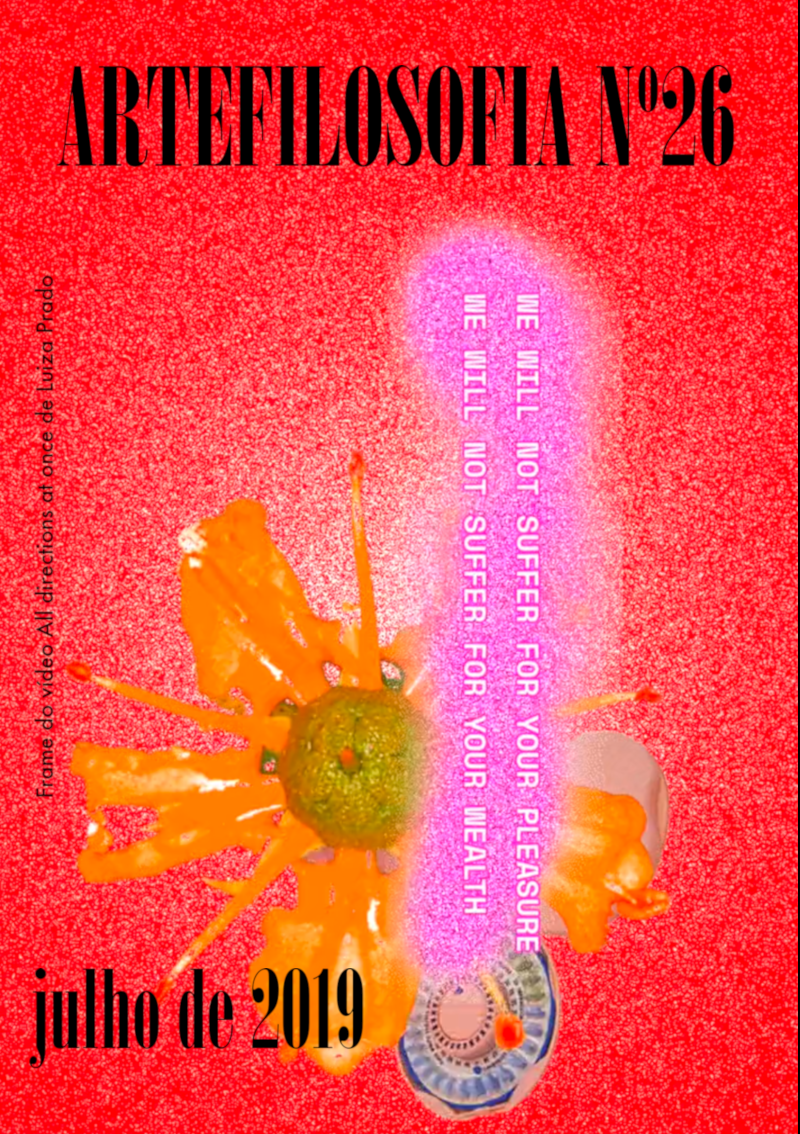Presumption, Poetry, Deviation:
The Art Concept in the Flusserian Thought
Abstract
This paper presents how the concept of art was approached ontologically in Vilém Flusser's early books, particularly in “Language and Reality” and “The History of the Devil”, to subsequently follow the political approach of some of his texts of the seventies and eighties. In his early philosophy, Flusser's allegory of the web and the language globe diagram both show that artistic (or poetic) activity creates language, which is the totality of civilization, culture, mind, nature, in short, of reality. In later texts, specially those that concern the notion of post-history, art appears as a way of emancipation from the technocratic discourse – in which the human being is established as an operator, a piece within the apparatus – and as redemption of knowledge and practices of strictly technical, commercial and programmed use. Continuities and differences between these perspectives point to the urgency of thinking about art, at the present time, as a reconstruction of politics.
Downloads
References
DUARTE, Rodrigo. “Prefácio”. In: FLUSSER, Vilém. Pós-História - vinte instantâneos e um modo de usar. São Paulo: Annablume, 2011.
FINGER, Anke. “On Creativity: Blue Dogs with Red Spots”. In: Flusser Studies, n. 10. Novembro, 2010.
FLUSSER, Vilém. Filosofia da caixa preta. São Paulo: Annablume, 2011.
FLUSSER, Vilém. Pós-História - vinte instantâneos e um modo de usar. São Paulo: Annablume, 2011.
FLUSSER, Vilém. “A Arte: O Belo e o Agradável”. Trad.: Rachel Cecília de Oliveira Costa. In: Artefilosofia, n. 11, UFOP, 2011.
FLUSSER, Vilém. . Ficções filosóficas. São Paulo: EDUSP, 1998.
FLUSSER, Vilém. “Criação científica e artística”. Conferência na Maison de la Culture, Chalon s/Saone, 26/3/1982. Disponível no Arquivo Flusser.
FLUSSER, Vilém. “Artifício, artefato, artimanha”. Conferência ministrada na Bienal de São Paulo, 1985. Disponível no Arquivo Flusser.
FLUSSER, Vilém. . “Habit: the True Aesthetic Criterium”. Manuscrito de 1990. Disponível no Arquivo Flusser.
FLUSSER, Vilém. .“The Photograph as Post - Industrial Object”. In: LEONARDO, Vol. 19, No. 4, pp. 329 - 332, 1986.
FLUSSER, Vilém. “O Espírito do Tempo nas Artes Plásticas”. Publicado originalmente em O Estado de São Paulo (703): 03/01/1971. Disponível no Arquivo Flusser.
FLUSSER, Vilém. “A arte como Embriaguez”. Publicado originalmente em Folha de São Paulo (255): 06/12/1981. Disponível no Arquivo Flusser.
FLUSSER, Vilém. Língua e Realidade. São Paulo: Annablume, 2007.
FLUSSER, Vilém. Bodenlos: uma autobiografia filosófica. São Paulo: Annablume, 2007.
FLUSSER, Vilém. Natural:mente: vários acessos ao significado da natureza. São Paulo: Duas Cidades, 1978.
FLUSSER, Vilém. A história do Diabo. São Paulo: Annablume, 2008.
GULDIN, Rainer. Pensar entre línguas. São Paulo: Annablume, 2010.
ÍÑIGO, Emilio Lledó. El Concepto “poíesis” en la filosofia griega. Madrid: Instituto Luis Vives de Filosofia, 1961.
PAZETTO, Debora. “O belo é elevado, o agradável é conservador”. In: Flusser Studies, n. 12, novembro de 2011.
SHINER, Larry, The invention of art: a cultural history. Chicago: University of Chicago Press, 2003.
Copyright (c) 2019 Artefilosofia

This work is licensed under a Creative Commons Attribution-NonCommercial-ShareAlike 4.0 International License.
Autores que publicam nesta revista concordam com os seguintes termos:
- Autores/as mantém os direitos autorais e concedem à revista o direito de primeira publicação, com o trabalho simultaneamente licenciado sob a creativecommons.org/licenses/by-nc-sa/4.0/ que permite o compartilhamento do trabalho, com reconhecimento da autoria e publicação inicial nesta revista.
- Autores/as têm autorização para assumir contratos adicionais separadamente, para distribuição não-exclusiva da versão do trabalho publicada nesta revista (ex.: publicar em repositório institucional ou como capítulo de livro), com reconhecimento de autoria e publicação inicial nesta revista.


